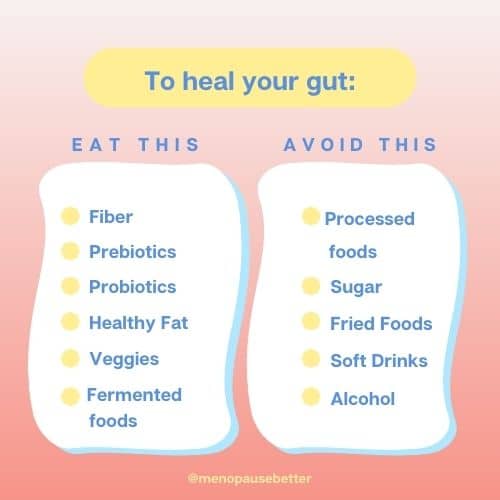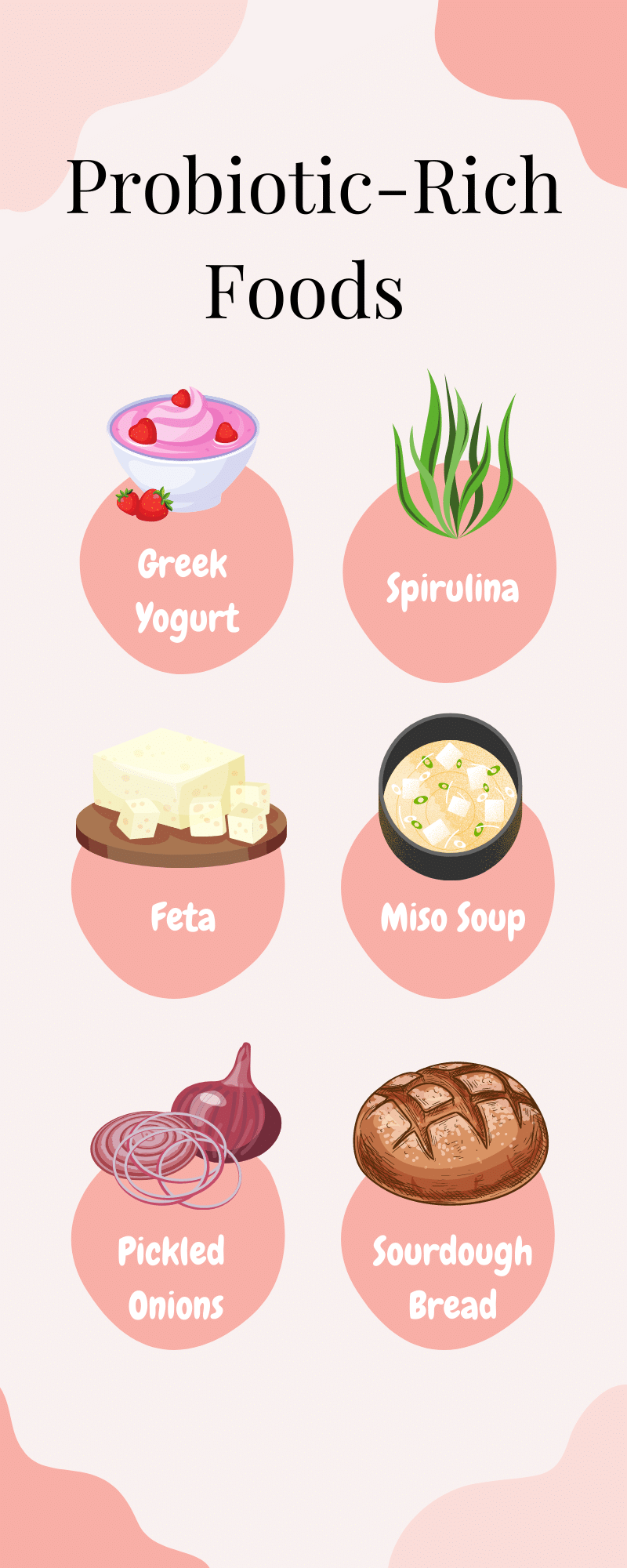Lose Menopause Weight By Healing Your Gut
The tiny bacteria in your gut are super important. Some experts even call the gut the “second brain” because it’s closely linked to your health, digestion, and mood.
Table of Contents
ToggleWhat’s even more exciting is that recent research has shown how balancing the good and bad bacteria in your GI tract can help you lose weight. So, let’s focus on your gut to shed that stubborn weight.
Why Does Gut Health Matter for Menopausal Weight Loss?
Your GI tract plays a big role in managing digestion and regulating metabolism. Early research suggests that an unhealthy gut can lead to more fat, a slower metabolism, and insulin resistance.
This connection is so powerful that transferring bacteria from the lower part of the GI tract of a slim person to an obese one can actually help the obese person lose weight. This process is called fecal transplantation. But don’t worry, there are simpler ways to heal your gut!
What Causes an Unhealthy Gut?
There are many causes of an unhealthy gut, including stress, a diet high in processed foods and sugar, excessive intake of alcohol and coffee, changing hormone levels related to menopause, use of antibiotics, and chronic diseases.
The best way to maintain a healthy gut microbiome is to ensure that there isn’t an overgrowth of bad bacteria compared to good bacteria.
How to Improve Your Gut Health Naturally
There are two important steps to heal your GI tract. The first is to remove foods that continuously damage your gut. The second is to add foods that help you heal.
Experts in functional medicine also recommend supplements.
Remove Foods That Damage Your Gut
The first step in healing is to remove foods that create an imbalance in your gut microbiome. These include:
Processed Foods
These foods have additives and salt that can harm your gut bacteria and decrease the diversity of your gut microbiota. They’re also usually low in fiber.
To keep your gut healthy, try to eat less or avoid these foods: fast food, bacon, sausage, packaged lunch meats, boxed meals, frozen dinners, ready-to-eat foods, potato chips, cakes, pastries, and other processed food
Sugar
Overeating sugar can increase the type of gut bacteria that promotes inflammation. Sugar can also reduce the bacteria that help create a strong barrier in the walls of the intestines, leading to a condition known as leaky gut.
Keeping this barrier healthy is essential because it prevents toxins from leaking into your bloodstream and your cells.
Decreasing your intake of sugar can be difficult, but as your gut heals, you will see that your sugar cravings decrease.
Read how to reduce sugar cravings here.
Alcohol
Drinking alcohol can be tough on your GI system. It can lead to inflammation, change how your gut bacteria work, and make the connections in your intestines less tight.
For those who want to enjoy a social drink but would like to limit alcohol, there are now many alternatives.
For instance, you can opt for sparkling water with lime, enjoy a delicious mocktail made with non-alcoholic ingredients, or even go for a relaxing walk instead of heading to a bar after work.
Fried Foods
Fried foods are filled with saturated and trans fats, which are difficult for the gut to digest.
If you’re craving fried foods, try air frying your favorite foods for the fried texture and flavor without the unhealthy fat.
Soft Drinks
Consuming soda in excess is associated with poor gut health. In fact, drinking sugar-sweetened soft drinks is linked to deaths from digestive diseases.
If you want a healthier soft drink alternative, try drinking kombucha, a fizzy and refreshing drink made from tea containing pre-and probiotics.
Another option is to drink homemade lemonade using only a tiny amount of sugar and sparkling water for that bubbly feeling so many people love.

Foods to Help Heal Your Gut
Once you remove the foods that damage your GI, it’s time to add foods that help balance your good and bad bacteria, leading to a healthier body.
Eat Foods High in Fiber
Fiber is processed in the colon. Good bacteria there break it down and consume it, leading to a diverse microbiota and a healthier gut.
Simple changes in your diet can achieve this goal, including eating the following foods regularly:
- Vegetables
- Fruits
- Whole grains such as whole-wheat pasta, cereals high in fiber, oats, buckwheat, quinoa, and brown rice
- Beans, lentils, and other legumes
According to the 2020-2025 Dietary Guidelines for Americans, the daily requirement for fiber for women younger than 50 is 25 grams. Women aged 51 or older need 21 grams.
Keep in mind that when you’re increasing the amount of fiber in your diet, it’s important to do so gradually to prevent diarrhea or bloating.
Eat Foods With Probiotics and Prebiotics
Prebiotics are a form of dietary fiber that sustains good bacteria in our large intestine. It can be obtained in complex carbohydrates found in fruits, vegetables, legumes, and whole grains.
Probiotics are good bacteria and yeasts. Probiotics live throughout the entire body, but they are mainly found in the digestive tract. These live organisms prevent the growth of bad bacteria.
Foods high in probiotics include fermented foods with live cultures, including yogurt, kimchi, miso, kefir, and sourdough bread. In addition, some people might choose to take a supplement.

Eat Healthy Fat
Healthy fats are essential for your overall gut health because they can help good bacteria grow and create a balanced microbiome.
Additionally, healthy fats are rich in omega-3 which lowers inflammation. Omega-3s are found in fish, walnuts, flax, and chia seeds. Try to include these foods in your everyday diet to help your gut!
Eat Fermented Foods
Naturally fermented foods can provide your body with good probiotics and strengthen your gastrointestinal function.
To add some beneficial fermented foods to your diet, try Korean pickled vegetables (kimchi), sauerkraut, miso, cultured milk, yogurt, and tempeh.
Stress and Gut Health
Do you get nauseous, bloated, or feel pain when you’re stressed? These symptoms happen because of the gut-brain connection.
Stress can affect how quickly the food passes through your body, potentially resulting in diarrhea or constipation.
It can also affect how the food you eat gets absorbed and digested, and it can cause a leaky gut.
When you find yourself stressed out, find an activity that eases the anxiety. Try meditating, doing yoga, going for a walk, doing some more strenuous exercise, or taking a long bubble bath.
The Bottom Line
New exciting research draws connections between menopause, gut health, and weight gain. At the same time, we already know that women in menopause face many challenges with their digestive systems. So it might be time to take our gut health seriously!

Dr. Su-Nui Escobar, a Registered Dietitian/Nutritionist in Miami, FL, is dedicated to empowering women in perimenopause and menopause to live healthier, more satisfying lives.
With a doctorate in clinical nutrition from the University of North Florida, she has expertise in menopause and weight loss, including the unique challenges faced by those on weight loss medications.
Su-Nui’s passion for her field is evident in her previous role as the Academy of Nutrition and Dietetics spokesperson.


